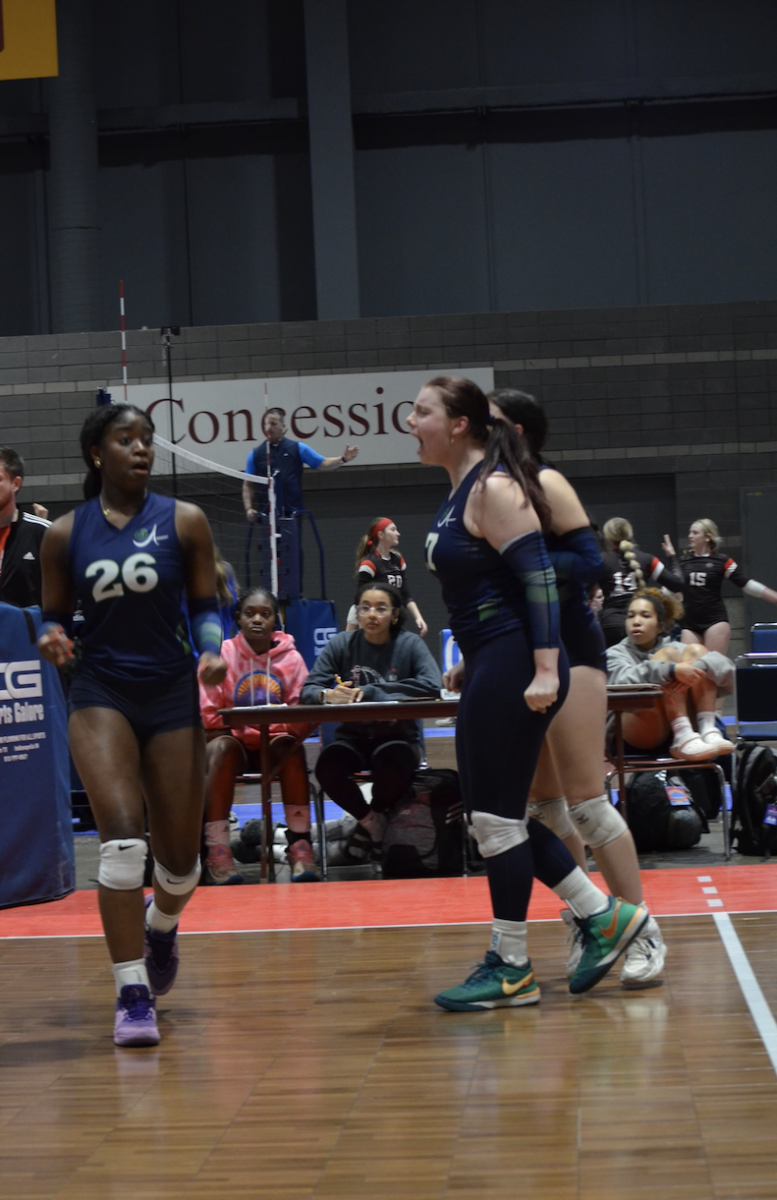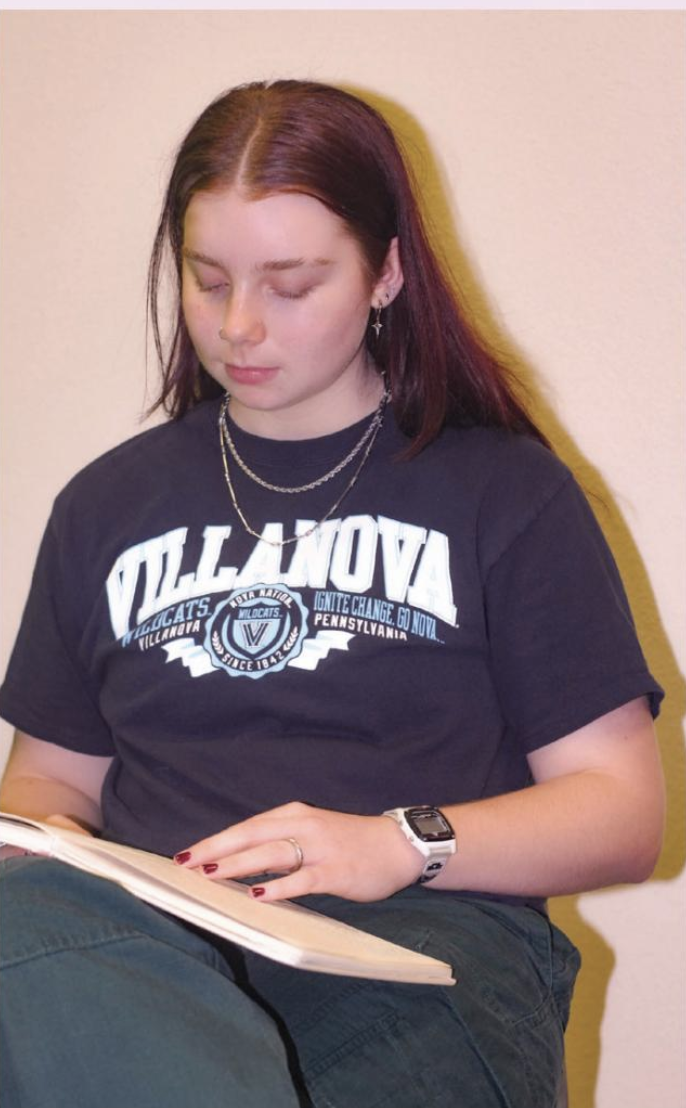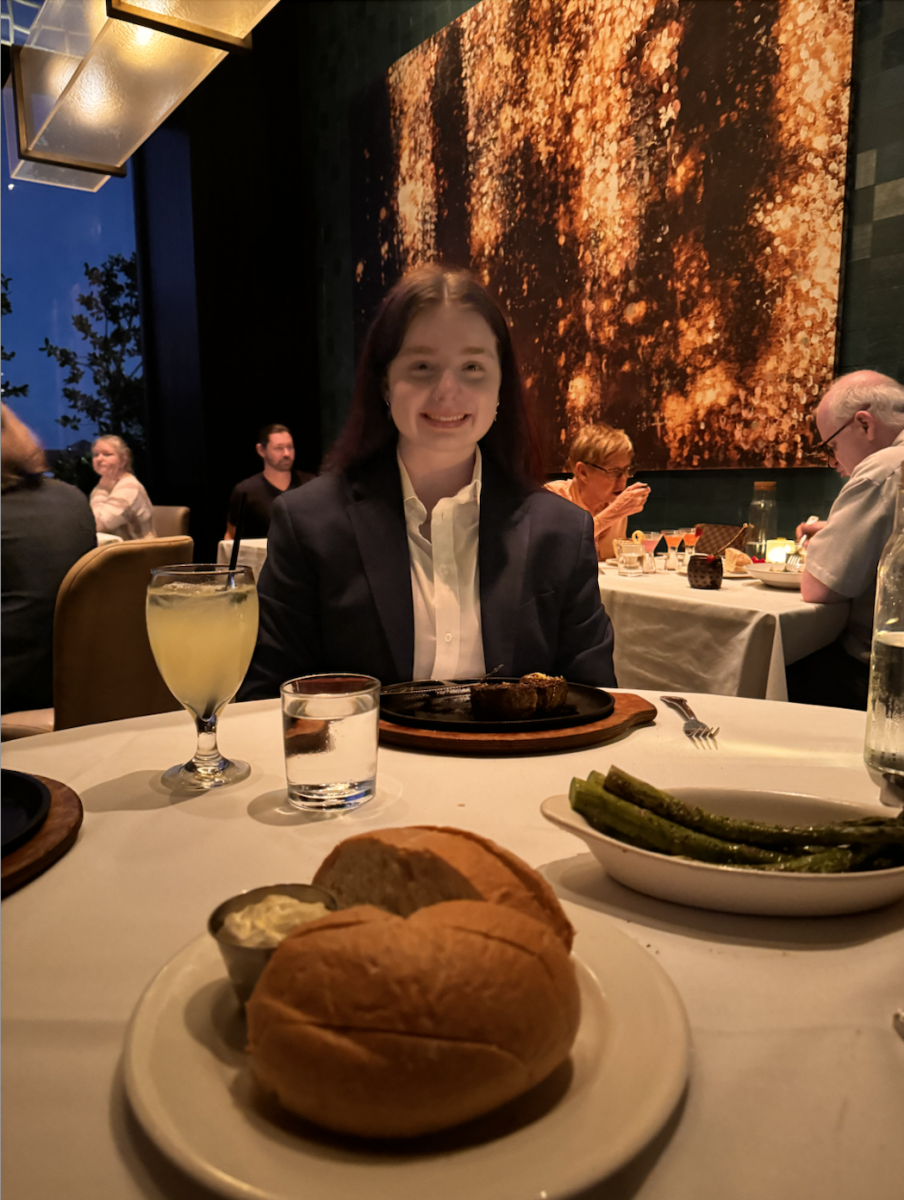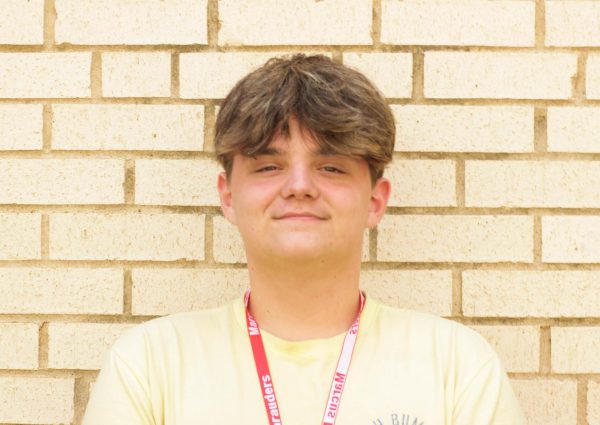Everyone around senior Chloe Heeter is already halfway through their dinner, but her plate is untouched. She looks at each of her teammates silently. Chloe searches their faces for any hesitancy, any unease, but she finds none. They laugh together, take bite after bite without a second thought.
She shifts in her seat next to her coach, and her silence grows noticeable. Her coach prompts her, asking why she isn’t eating. To keep up appearances, she takes an awkward spoonful. Then she takes a few more.
Waiting for a moment alone, Chloe rushes to the bathroom, hoping to cry by herself, but a teammate follows her inside. Small talk temporarily overshadows her noisy thoughts, and they return to the table.
As everyone says their goodbyes, Chloe packs up her dinner, half of which is untouched.
“I can’t be like this anymore,” she tells herself. She needs to be skinnier. Doing this gives her a sense of control over herself. She can’t stop now.
Her anorexia has gone too far.
***
Grappling with underlying anxiety and depression, Chloe moved to Texas before her freshman year. She felt lonely, unable to make new connections.
“It was really hard for me to try and make friends,” Chloe said. “I got on the volleyball team, and all of them were like the only people I really knew.”
But she never quite clicked with her teammates.
Nevertheless, Chloe threw herself into her sport. Living in North Texas, one of the largest areas in the country for serious youth volleyball, fueled her competitive spirit. Every day was an extensive regimen, working out, practicing, and watching old tapes to improve.

“I didn’t talk to anyone because I was like, ‘I’m just going to get better because I want to focus on myself,’” Chloe said. “I was also just really socially anxious during freshman and sophomore year, and most of it was because I wasn’t eating.”
Chloe began comparing her body to her teammates, wondering what she could fix, how she could fix it. She said her obsession with her sport turned into an obsession with her weight and how she looked.
“I’d had problems with eating since seventh grade,” Chloe said. “I just wanted to be skinnier because all of the volleyball girls were.”
Dinners with her team were especially difficult. Seeing what she wanted for herself in other people made her feel small and made her want to be smaller.
“I’d purposely trigger myself all the time,” Chloe said. “I would be triggered by seeing other people just existing which took me a really long time to get over.”
These thoughts were always present in her mind. They became more powerful the more attention she paid to them. As an outlet, Chloe took pen to paper and let her inner feelings loose in her journal.
I started talking to this girl last week, and I really liked her. I just feel like she won’t like me, and I’m so jealous of her body. I know that’s bad, but I seriously can’t help it.
The only way she saw fit to change herself was to change her diet — to not eat, even when her body needed it.
Her stamina while playing volleyball began to fall and hurt her ability to play. Feeling unsatisfied with her performance, Chloe rushed to the locker room to decompress.
“My sophomore year at practice, I’d be exhausted all the time,” Chloe said. “I passed out in the bathroom, and I also got hurt a lot easier because my bones weren’t healthy.”
But this wasn’t enough motivation to stop. While hitting a volleyball against the side of her house, Chloe’s mom texted her, asking if she had eaten dinner yet. Chloe replied yes, despite not having eaten nor having any intention to do so. Her mother came home to find her still practicing relentlessly.
“What did you eat?” her mother asked.
“A frozen dinner,” Chloe replied.
But her mother knew something was off. She went back inside the house and lifted the lid of the trashcan, expecting to find the frozen dinner. She came back out with the trash can and asked Chloe where the food was. Chloe said she ate it in her room.
Still not fully believing her, Chloe’s mother brought her empty bedroom trash can outside and set it down.
“Are you lying?” she questioned.
“I don’t know,” Chloe said.
Her mother’s back slid down the brick wall until she was positioned next to Chloe on the ground. Tears streamed as they talked, and her mother began to realize the gravity of Chloe’s situation.
“I think that was probably the first time my mom said anything about it,” Chloe said. “But it took over a year for me to get actual treatment.”
Chloe began attending a nutritionist and therapist, both of whom assessed her needs and diagnosed her with anorexia. Her eating disorder was finally being recognized, but it wasn’t what she wanted.

I feel so depressed/tired all the time. The nutritionist said it was because I’m not eating, but not eating makes me feel so good.
At that point, Chloe’s brain had made every food seem like the enemy. Her nutritionist told her that she had malnutrition, but she took that as a sign she was doing well. When her eating disorder continued to progress, Chloe’s therapist assigned her to a partial hospitalization program (PHP) at a treatment center which she would attend daily from 8 a.m. to 6 p.m.
“I was mad because I wasn’t going in-patient yet,” Chloe said. “But I felt accomplished because she thought I was sick enough to go to an actual treatment center instead of doing outpatient.”
Chloe went to PHP in October of 2022. There, patients were given breakfast, snacks, lunch, and dinner seven days a week. In December, Chloe was moved up to residential, where she would stay at the treatment center full time.
”I was so happy because I was like, ‘That means I’m losing weight,” Chloe said. “‘That means I’m getting skinnier and that I actually need help.’”
Every day was a strict schedule, with meal times, urine tests, school, and activities. Chloe struggled to finish her meals without supplements — replacements like protein shakes and Cliff bars if patients can’t eat the meals. The Friday after she arrived, Chloe’s doctors told her that if she couldn’t finish her meal without supplements, she would have to get a nasogastric feeding tube that Monday. She began making progress, but she faced an unfortunate setback.
“On the way to the bathroom, I passed out when I was getting up for them to check my pee,” Chloe said. “I was in a wheelchair for three weeks because I couldn’t walk.”
With the wheelchair, her feeding tube went up through her nose and rolled around with her. The tube would give her nutrients like vitamins, carbs, and protein. After Chloe got off her tube, she was put in isolation because she still had trouble eating.
“I couldn’t be with the group at all, and I had to eat outside,” Chloe said. “I had to stay outside in the hallway and no one was allowed to talk to me.”
The isolation was in hopes that she would be more motivated to eat. After four excruciatingly long days, she got to go back to her group, but she regressed a little while after. She struggled to complete her meals again, so they said they would send her back to isolation.
I’m in isolation again. I went in the fresh air. I think I’ll actually try this time. I got letters from Erica, Sarah, and Riley. One from Megan, too.
A little before she went to the treatment center, she got to form close bonds with new people. It was difficult for them to hear about what Chloe was going through because they felt like they never picked up on it.
“I was talking to my friend Foster, and he was like, ‘I never thought anything because you always had something for lunch,’” Chloe said. “That was like the only time I did eat.”
She thought everyone would notice if she gained any weight, but they never did.
“I realized that my weight is the least important part about me,” Chloe said.
Her friends supported her through her entire journey, writing letters and secretly DMing her. Sophomore Ivanna Cavazos-Flores was part of this aspect of Chloe’s recovery process.
“I would text her as often as possible so I could check up on her and see how she was feeling,” Ivanna said. “Now that Chloe is thriving and in such a better place, I have seen her happier, healthier, and living life to the fullest, not worrying about her image.”

Recovery was a difficult and lengthy process, but Chloe moved back down to PHP by February, and then to intensive outpatient care at the end of March. Now she meets regularly with a therapist and nutritionist. While she still considers herself in recovery, she has mostly healed from her eating disorder.
Now that she has a new mindset, she picks up on little phrases she hears everywhere. People casually say, “I’m so fat,” or call their friends fat. Chloe said it bothers her because almost everyone has likely struggled with eating at one point, so the jokes are insensitive. However, Chloe said she refrains from speaking up because it is a realization everyone will have eventually.
“I don’t even remember people saying stuff like that in freshman and sophomore year,” Chloe said. “They probably did but I was already saying those things to myself, so it didn’t really affect me.”
Phrases like this followed her as she made her way back onto the volleyball court, where her eating disorder was first amplified. Her return to being an athlete was difficult, so she wanted to start an Instagram account to inspire other athletes going through the same thing.
“I would look at recovery accounts and just compare my body to theirs because they’re recovering too, but they are all super skinny,” Chloe said. “I wanted to share my story to try and let people know that no matter what you look like, you can be affected by this.”
Chloe would make healthy meals and post them on her recovery account. She said that posting aesthetic meals would motivate her to eat.
“I would make my oatmeal look so pretty,” Chloe said. “I also got really into body positivity/neutrality.”
Chloe has taken down the recovery account since then, but she continues to make progress off the screen. She can see the gradual change in herself, in her mindset and notices that she doesn’t stress so much about eating anymore.
“I’m impressed by myself because now I don’t think about it,” Chloe said. “Now I’m much more social, like I can do anything.”







